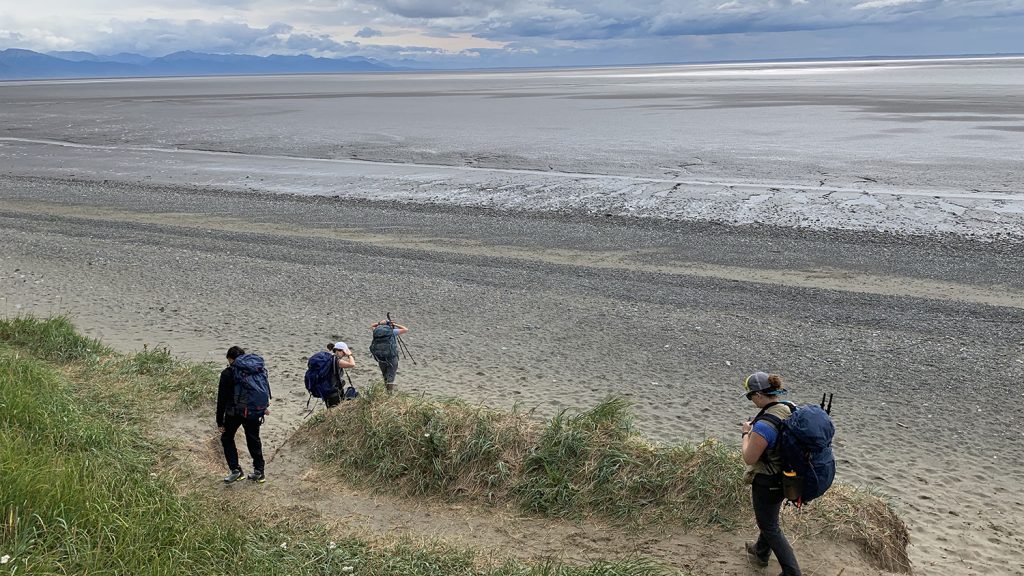Earth Science

Earth Science
Students applying for admission to the M.S. or Ph.D. programs in the Earth sciences should have an adequate background in geology, as well as at least one year each of chemistry, physics, and calculus. Student with degrees in related fields (e.g., mathematics, engineering, chemistry, physics, and biology) are also strongly encouraged to apply. Typically, a student’s graduate course work is tailored based on their research interests, with sufficient flexibility to address any deficiencies that may be identified. MEAS is an inter-disciplinary geoscience department, and graduate students are encouraged to explore coursework beyond their focus areas, both within our program and across the University.
Graduate Research Themes in the Earth Sciences
Climate Science
Earth Systems History
Geochemistry
Geomorphology
Geoscience Education
Hydrology and Water Resources
Marine and Coastal Geology
Quaternary Geology
Sedimentology
Structural Geology and Tectonics
Volcanic and Magmatic Systems
Research Activity
Independent research is an integral part of a graduate program and should be your major consideration in the selection of a graduate school. An MS applicant should have determined a general area of research interest within the broad area of geology. Ph.D. applicants should be thinking in terms of a specific focus and individual faculty with whom to conduct their research study. Material to consider in comparison of departments includes faculty research interests, graduate courses, student research activities, and facilities needed to support your research. As we realize this is an important decision, you are urged to directly contact the faculty member(s) whose professional interests are most closely allied with your own.
Research in the earth science program at NC State tends to concentrate in the following general areas:
Climate Science – Studies investigating climate archives through time and across geologic settings; quantifying climate impacts in the terrestrial, marine and cryosphere systems; and developing tools for examining climate conditions and impacts in the past and future.
Geochemistry – Research using geochemistry, stable isotopes chemistry and radiochemistry to address problems in both modern sediments, ancient strata, surface and ground waters.
Geomorphology – Assessment of the processes shaping the terrestrial landscape including erosion, tectonics, climate, biogeomorphology and anthropogenic activities. Research studies are field-based, process-oriented, and multidisciplinary in nature.
Geoscience Education – Studies are focused on the process of learning (geo-cognition, teaching strategies), the incentives for learning and the development of learning from freshman to graduate student.
Earth Systems History – Outcrop and subsurface studies of ancient sedimentary strata tend to focus on detrital-dominated stratigraphic intervals. Studies usually combine various aspects of petrography, paleontology, geochemistry, facies architecture, reconstruction of depositional environments, seismic stratigraphy and basin evolution.
Hydrology and Water Resources – Research in hydrology and hydrogeology focuses on groundwater flow, groundwater exchange with surface water bodies (rivers, canals, lakes), watershed hydrology, glacial hydrology, and the use of naturally occurring chemical tracers in quantifying water flow and mixing.
Marine and Coastal Geology – Major research themes include sediment transport and diagenesis, river delta evolution, sea level rise, coastal erosion and flooding, and geophysical studies in lacustrine and ocean environments. Many research projects involve time spent at sea collecting data.
Quaternary Geology – Major research include studies of rate and magnitude of climate and associated environmental change, paleoceanography and paleoclimatology, stratigraphy and geochronology, and glacial geology.
Sedimentology – Research in sedimentology includes studies of terrestrial and marine sediment transport and deposition, sea level change, paleoseismology and paleoclimatology.
Structural Geology and Tectonics – Investigations are focused on lithospheric plate margins, fault evolution, seismology, paleoseismology and tectonic geomorphology. Studies usually combine field investigations, laboratory-based measurements, geophysical analysis, geochronology, and numerical modeling.
Volcanic and Magmatic Systems – Research exploring melt generation and transport, the dynamics of subaerial and submarine eruptions, and the morphology of lava flows. Studies make use of field mapping, remotely sensed data, geophysical observations and laboratory experiments.
Other Information
If you decide to enter the program at NC State, you should plan to arrive a few days before the semester starts to become familiar with the department, meet with your advisor, complete registration if necessary and determine your office assignment. Several required meetings are associated with the start of classes, and you will be informed of their specific dates by letter. Students are encouraged to enroll in the First Year Graduate Seminar, where they are familiarized with the requirements of the program and introduced to important resources in the department and elsewhere on campus.
Since research is a major purpose of graduate study, you will be strongly encouraged to present your results at an appropriate professional meeting. Actual preparation of your thesis or dissertation usually will follow a format adaptable to publication in a professional journal.